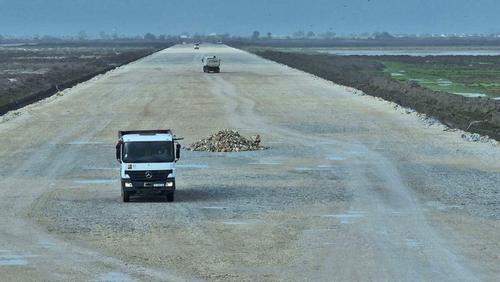The 2024 Enlargement Package identifies some environmental issues in the Western Balkans, limited progress in addressing them, and leaves room for manoeuvring at the expense of biodiversity.

Trucks on the runway of the planned Vlora airport: The construction site is located along an important migratory bird route, the Adriatic Flyway.
© Arsen Rroshi
Large birds such as flamingos and pelicans live at Narta lagoon, close to the airport construction site.
© PPNEABrussels, Radolfzell. In its 2024 Enlargement Report, the European Commission presents a reserved acknowledgement of limited progress in addressing environmental and biodiversity issues. Albania, Bosnia and Herzegovina, Kosovo, North Macedonia, Montenegro, and Serbia are systemically failing in transposing and implementing key parts of horizontal legislation, highlighting here the Environmental Impact Assessment and Strategic Environmental Assessment directives, as well as the significant struggles in management of protected areas and national parks, and the protection and management of endangered species. It is without a doubt, that countries need to take concrete steps in transposing the Birds and Habitats Directives.
The Commission's findings underscore that despite some advancements, the countries’ efforts fall short of establishing robust, transparent, and participatory frameworks essential for effective environmental governance. The Enlargement Package points to a recurring issue mirrored across the Western Balkans, namely the lack of comprehensive national strategies and sufficient administrative capacities to enforce existing laws effectively and transpose the ones that are missing.
Moreover, the report rightly highlights the amendments to Albania's Protected Area Law that increase flexibility for harmful economic and mass tourism developments. This legislative manoeuvring appears to align with a broader regional trend where economic interests do not adhere to sustainable development practices, at the expense of nature.
“The Enlargement Report has identified numerous environmental issues in the Western Balkans, notably in the management of protected areas and biodiversity related laws. However, the report falls short of fully addressing the critical impacts of ongoing projects such as the Vlora International Airport. While the Commission has acknowledged the problems to a limited extent, it has not provided robust guidance or called for concrete actions to remedy these pressing issues, missing a crucial opportunity to lead with strong environmental governance. We express concern over this, and in light of the recent opening of negotiating clusters, we call on the EU to set clear benchmarks for Albania, including the immediate cessation of construction at the designated airport site and a comprehensive reassessment of the project in alignment with conservation goals,” says Gabriel Schwaderer, Executive Director of EuroNatur. “Albania must take swift action to restore damaged ecosystems, repeal recent changes to its Protected Area Law, and ensure environmental justice.”
Viktor Berishaj, Senior Policy Officer at EuroNatur adds: “While the EU Commission's report may lack a forceful call to action, it unmistakably highlights the critical need for the countries of Western Balkans to enhance its environmental policies and practices. By doing so, countries will not only align with the EU's environmental framework but also ensure that the region’s rich natural heritage is preserved. It is crucial that the countries take concrete steps in transposing the Nature Directives, namely the Birds and Habitats Directives. EuroNatur remains committed to contributing to this process, and will continue to advocate for a transparent, inclusive, and scientifically grounded approach to environmental governance.”
Reflecting on recent lithium debate in Serbia, Berishaj also points out: “It is striking that the EU only acknowledges the signing of the Memorandum of Understanding (MoU) with Serbia for launching the Strategic Partnership on sustainable raw materials, battery value chains and electric vehicles. While the MoU underlines the importance of promoting the highest environmental, social and governance standards, the EU Commission fails to connect the logical dots of its own findings, namely with the missing implementation framework in Serbia. Promotion of highest standards is not the same as having and implementing them, something that Serbia has systematically failed to do.”
Background information:
- Here you can find the link to the enlargement report: https://ec.europa.eu/commission/presscorner/detail/en/ip_24_5583
- Western Balkans is a region consisting of Albania, Bosnia and Herzegovina, Kosovo, Montenegro, North Macedonia and Serbia. They aspire to becoming Member States of the European Union, as does Ukraine, Georgia and Moldova. Due to this, they are also referred to as Enlargement Countries.
Contact:
Anja Arning, anja.arning(at)euronatur.org, Tel.: +49 (0)7732 – 92 72 13
Select on which of your areas of interest you would like to receive our press releases.
You can subscribe to our RSS feeds to receive all the news on the topics of your choice.


